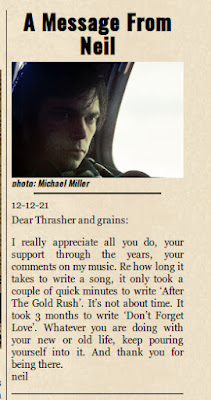David Briggs and Neil Young: "How Survivals, Grief and Legacies Unfold in American Music" by Caryn Rose

"How Survivals, Grief and Legacies Unfold in American Music"
by Caryn Rose @ 2019 Pop Conference at MoPop - Seattle
The late David Briggs was Neil Young's producer on several key albums including Tonight's The Night, Zuma and Ragged Glory. Briggs' influence on the recording process has been lauded as a major contributing factor to Neil Young's recording success bringing a unique "discipline" to the process.
David Briggs and Neil Young make for an interesting intersection at this year's 2019 Pop Conference at MoPop for the conference theme "How Survivals, Grief and Legacies Unfold in American Music" by Caryn Rose.
Caryn Rose is a music writer, crabby old punk rock lady writing for P4K, Pollstar, Vulture, NPR and Salon. Caryn's session on David Briggs and Neil Young addresses “Growing Up In Public: Musicians Processing Loss in Modern Times.”
The David Briggs and Neil Young section begins at ~4:00.
Caryn Rose's thesis centers on the 1996 "The Year of the Horse" concept which came from longtime Neil Young and Crazy Horse producer David Briggs:
"Probably more the fifth member of Crazy Horse than anybody could ever be," says Frank "Poncho" Sampedro. Shortly before his death in November of 1995, Briggs was looking ahead to the coming year and told Young, "This is the Year of the Horse ." According to Young, Briggs also told him: "All you have to do now is get closer to the source. Keep getting purer and purer."(source: official Crazy Horse Reprise Records Biography, May, 1997. PR for Year of The Horse, directed by Jim Jarmusch.)
On the meaning of tribute, the collective experience of death, and how musicians mourn their own. Brilliance at #popcon2019 with @carynrose and @anniezaleski pic.twitter.com/GoDUs9QltU
— Michelle Villegas Threadgould (@Mthreadgould) April 13, 2019
From symposium agenda Only You and Your Ghost Will Know: Music, Death and Afterlife
2019 Pop Conference at MoPop:
Popular music has long been centrally concerned with death and the afterlife.
Songs, recordings, and musical traditions have expressed both mourning and celebration and have—in some cases—helped envision the possibilities of a continued existence where “death is not the end.” From gospel to metal and beyond, music pays tribute to the departed, offers opportunities for ceremony and commemoration, and helps to process tragedies both personal and public. It even blurs the boundaries between states of life and death, offering sonic and symbolic evidence for hauntings, purgatories, and the continued presence of ancestors in the lives of the earthbound. Genres, formats, and media exist in a continual process of transformation, decay, and re-emergence—and boost both active artists and defunct (or deceased) ones. Songs and performances are reborn through new versions, different contexts, and changing relationships with audiences.
Beyond this, pop music cycles through its own series of “deaths” and “afterlives.” The work of the deceased is remixed, reclaimed, and reconstituted by new generations of musicians, scholars, compilers, and fan communities, while record companies, museums, tourist sites, and others preserve, profit from, and sometimes fetishize their memory. (These commemorations have taken on a distinctively digital character in the era of social media, YouTube, holograms, and the continued use of sampling.) And pop music—in its many forms—offers a cultural afterlife for sounds and populations that have been dispersed and displaced, helping to form new communities and maintain connections to those that have been lost.
While a constant concern, recent years have only amplified these dynamics. A wave of prominent musician deaths, from David Bowie to Aretha Franklin, has amplified conversations over music’s relationship to mortality and the nature of fan mourning in the digital age. (Some of these attempts, like the proposed use of a Prince hologram at the 2017 Super Bowl, have been greeted with controversy.) Public tragedies from killings marked by #BlackLivesMatter memorials to ongoing refugee crises have been suffused with music as both sustenance and response, while the rise of mass shootings at music venues from Paris to the Pulse nightclub provoked specific responses from affected artists and audiences as well as a broader championing of music as a means of memorial and healing. And, across genre and language, music continues to contend with the questions of life, death, and potential resurrection as a central subject matter and metaphor for conversations ranging from the economics of streaming to the health of genres like country and hip-hop.
Photo by Pegi Young
(Click photo to enlarge)
Also, see:
- Friends of Neil: David Briggs
- Comment of the Moment: Producer David Briggs and Neil Young
- David Briggs in Memorium
- David Briggs Obituary - NY Times, 12/3/95
- Interview with Elliot Roberts on working with David Briggs
Labels: crazy horse, david briggs, neil young


































 Human Highway
Human Highway

















 Concert Review of the Moment
Concert Review of the Moment





 This Land is My Land
This Land is My Land

 FREEDOM In A New Year
FREEDOM In A New Year









 *Thanks Neil!*
*Thanks Neil!*




![[EFC Blue Ribbon - Free Speech Online]](http://www.thrasherswheat.org/gifs/free-speech.gif)











 The Unbearable Lightness of Being Neil Young
The Unbearable Lightness of Being Neil Young Pardon My Heart
Pardon My Heart



 "We're The Ones
"We're The Ones  Thanks for Supporting Thrasher's Wheat!
Thanks for Supporting Thrasher's Wheat!




 This blog
This blog 
 (... he didn't kill himself either...)
#AaronDidntKillHimself
(... he didn't kill himself either...)
#AaronDidntKillHimself









































































 Neil Young's Moon Songs
Neil Young's Moon Songs




 Civic Duty Is Not Terrorism
Civic Duty Is Not Terrorism Orwell (and Grandpa) Was Right
Orwell (and Grandpa) Was Right


 What's So Funny About
What's So Funny About 



9 Comments:
David Briggs was the last person Neil Young listened to, whose criticisms caused him to re-evaluate his music, and change it for the better. Since David left, Neil's adrift in 'yes men' who keep telling him his new songs are genius. And, IMHO, almost his entire output since David's death has sucked.
“Be great or be gone.” Neil quoting Briggs, Waging Heavy Peace: A Hippie Dream
Neil blew out the candle's flame
Brigg's still illuminates Neil's way to the place to visit the Great Spirit
May the new Crazy Horse album being created in the Rockies be close the the source
Pure Horse.
I concur with willforestwater but would add that the loss of Ben Keith has also had a negative impact on recent output.
While the loss of Briggs (almost 25 years ago) and Keith (almost a decade ago) were no doubt formative to where Neil has taken his music since, I wouldn't jump to any conclusions that Neil has succumbed to "Yes men" as a result. He clearly records what he wants and when he wants, as it's brewing away inside him and then pukes it up and moves on. History becomes the ultimate judge, and it's kinda neat to see the reinvigoration today surrounding his former discount bin albums from his Geffen discography. While not my faves in such a vast discography, the last handful of albums fit the long-established mold and the fact that we are all following this blog and participating in this discussion illustrates just how vibrant Neil and his music (all of it) remain in our lives.
@ willforestwater - ummm, pardon us, but "Ramada Inn"? "No Hidden Path"? to name a few that don't suck ...
@ Hounds That Howl - yep, what a mantra -- “Be great or be gone.”
trying to live the Pure Horse life everyday here @ TW.
@ Mark from T.O. - yeah, it is remarkable to see TRANS and other 80s albums being pretty sought after vinyl relics. TRANS being championed by Jack White, Margo Price, Micah Nelson, Kurt Vile and so many other hipsters (meant only the in the best sense of the word) who get it. We are fortunate to have the vibrancy, color and life that Neil and his music enriches us with all every single day.
In baseball, Ty Cobb is recognized as having the highest batting average in MLB history, having batted .366 over 24 seasons.
Neil's career spans more than 50 seasons, and if we look over his entire discography of studio releases, I'd say that most of us reading this would score him (thumbs up or thumbs down, on balance) at well at over .750 Pull it up online and see for yerself.
Those are GOAT-like success #'s no matter how you cut it, across any sport or genre of entertainment. If you were to sit down even the most casual of Neil fan (someone who is not even aware of TW for eg. and has never seen him live, or maybe one show somewhere along the line), and go through his entire body of work album-by-album, they would still likely score him north of .400
When Ty Cobb retired it is likely most people lacked an appreciation for what his career #'s meant. Today, 90 years on, the legacy is affirmed and it hits home with impact. Me thinks Neil's career-spanning legacy is only just beginning, and some of those "strike-out" or "walk" albums are perhaps being revisted and recognized as a "hit and RBI" after all.
I relish what he may still have left in the tank and wherever direction his inner compass settings are taking him at any point in time.
i mean who the fuck sees a movie, calls the actress and suggests a meet. Shes all "I had never heard of Neil Young" sorry, to that effect. . and I believe that. Yet a many years relationship develops.
Trans was a good innovative record with good songs - Life and LOW aren't and don't need re-evaluating.
Neil and David,unique persons.Genuine and crazy about good,heartfelt music.Briggs' memory lives on through Neil's music.Listen to it and you'll probably agree with me.Cees Mostert,Europe.
Post a Comment
<< Home